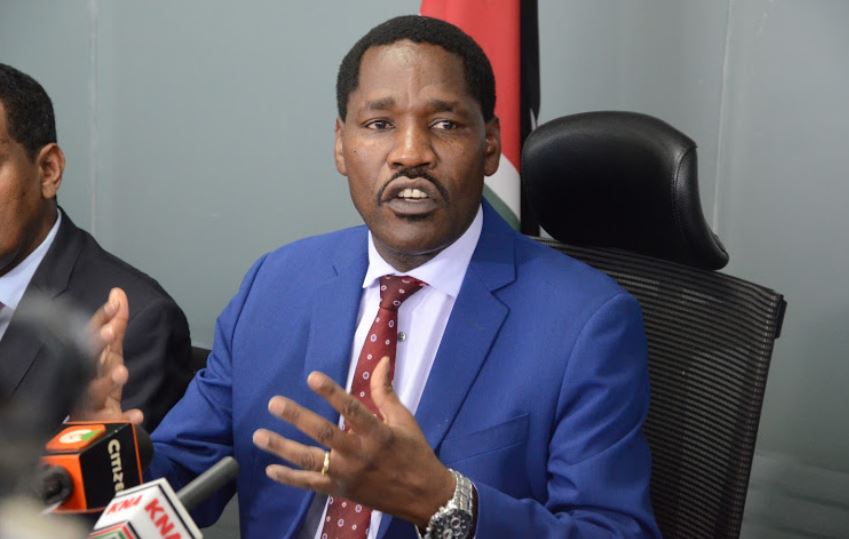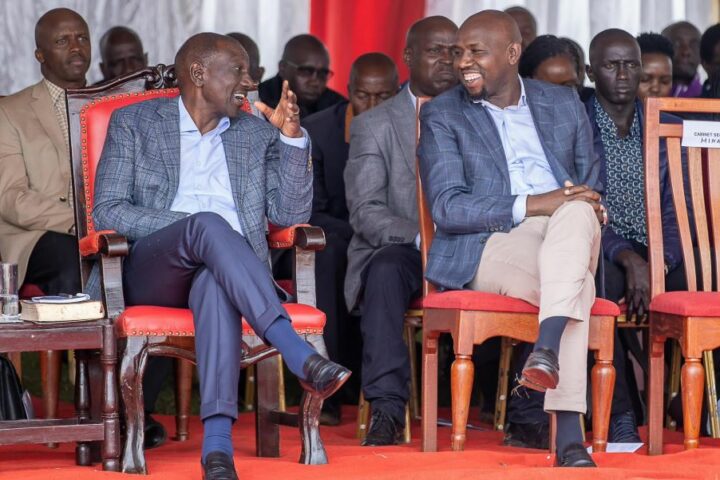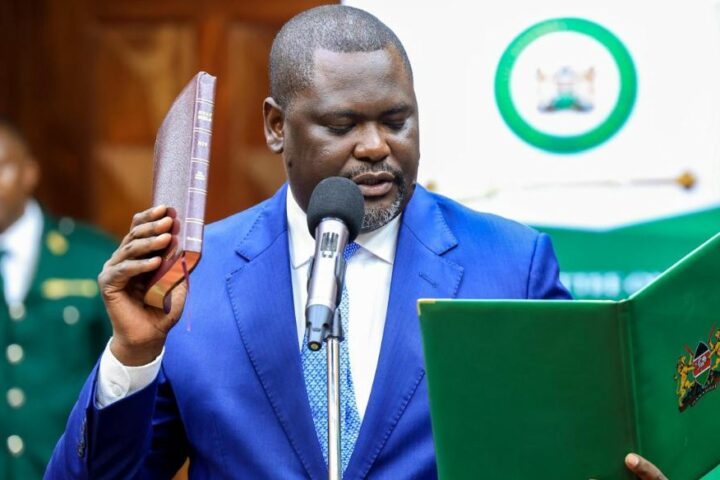 Agriculture, Livestock and Fisheries Cabinet Secretary Peter Munya faced questions from the public via Sunday Nation.
Agriculture, Livestock and Fisheries Cabinet Secretary Peter Munya faced questions from the public via Sunday Nation.
1. Were your recent remarks that the yellow locusts are not a threat to human beings scientifically proven? Could you please shed some light on this? Francis Njuguna, Kibichoi
My remarks were taken out of context. Scientifically, it is acknowledged that as the locusts transform, their bodies assume extra muscle mass, load up on carbohydrates, especially as they change to the gregarious phenotype. They consequently change from the black and yellow colour which are not as dangerous as the hoppers (instar stage one and two upon hatching), which are “voracious feeders”.
But once the locusts become yellow, which are adults that are ready to copulate, the females lay eggs on the moist ground, and die.
In context, however, the yellow locusts could wreak more damage if allowed to breed a new generation. And that is why my ministry is putting in all resources to contain these subsequent upsurges.
2. The average age of farmers in Kenya is 60. What efforts are you putting in place to enable young people to get involved in agriculture? Raphael Obonyo, Nairobi
My ministry, together with county governments, and in collaboration with development partners have developed a National Youth in Agribusiness Strategy (2017-2021).
The strategy aims at creating innovative, attractive and sustainable employment opportunities for the youth through active engagement in agribusiness. I encourage the youths to acquaint themselves with this strategy.
My ministry also implements the Enable Youth Programme, whose objective is to create business opportunities and decent employment for young women and men along priority agricultural value chains, through the provision of entrepreneurship skills, funding and business linkages.
The ministry has developed the Kenya Youth in Agribusiness strategy (2018-2022) and it is available online.
The strategy guides youth engagement in agribusiness by identifying the challenges facing the youth and proposing interventions by sector players.
The ministry also developed the Gender Mainstreaming Strategy and Gender Mainstreaming Guidelines in 2007 to generate equality in agricultural processes and activities.
The 4K manual has been developed to guide establishment and running of school clubs. The manual is an attempt to address the negative attitude towards these future agriculture practitioners.
The government is also developing a curriculum for agricultural technical and vocational education training to capacity build the youth on modern and innovative ways of practising agriculture as a business.
3. At independence, Kenya had created legislation to support the dairy and pork industries as high growth sectors. While the dairy sector has grown thanks to considerable government support, the pork industry has declined with pig populations stagnating over the last ten years. What plans does the ministry have to revive the pork industry? Sam Watene, Nairobi
My ministry is addressing the pork subsector in two ways: One, policy legislative environment through the review of the Livestock Policy and Livestock Bill which are at the Cabinet level and will be approved in a short while. These tools will create a conducive environment to the revival and development of the pig industry.
Two, my ministry has identified pig production as a priority area for the attainment of 100 per cent food and nutrition security, and we are therefore enhancing the breeding, multiplication and distribution capacity of piglets at the ministries’ institutes, namely Ngong and Naivasha vet farms.
4. There is this matter of the ban imposed on fairly priced fertiliser from Morocco because it is ‘poisonous’ yet other countries buy it. Instead, Kenya prefers to source its fertiliser from Russia where it is fairly expensive. Will you engage the Kenya Bureau of Standards on this matter? Githuku Mungai, Nairobi
Yes, my ministry is systematically reforming the inputs subsidy programme (e-voucher system) for proper targeting and appropriate input supply.
This process will be private sector-led, and will involve soil testing, capacity strengthening of SMEs (agro-vets) to supply standard inputs, in liaison with the Kenya Bureau of standards. It is the private sector that will import inputs, which will be supplied to farmers using a voucher.
5. On the occasional dishing out of money to New KCC by the government in the name of subsidising the farmer, it appears as if this programme is not properly structured. Does the New KCC deserve to get the handouts? Githuku Mungai, Nairobi
The recent fairly heavy rains that were experienced in the country led to overproduction of milk, causing the market dynamics to push milk prices to unsustainable levels.
Therefore, it was necessary for the government to intervene, by rescuing the farmer without harming the New KCC. The government, therefore, financed the firm to buy and process excess milk into powder for storage and subsequent future reconstitution. In other words, we are enhancing the national milk reserve.
6. For nearly two months, locusts have devastated several parts of the country. Has your ministry tried to quantify the cost the insects have caused to farmers and the impact their unwelcome visit will have on food security? Neville Amboso, Isiolo
My ministry has put up a team of experts who will soon be dispatched to counties to conduct damage assessments.
7. Is the government aware that there has been total breakdown of disease control in counties to the point that disease outbreaks is causing massive havoc to the sector, wiping away the investments that had been done? Zoonotic diseases such as rabies, anthrax, brucellosis are on the rise. What measures have you put in place to arrest the situation which is threatening human health? Dr Miheso Mulembani, secretary general, Union of Veterinary Practitioners Kenya
I take note that livestock disease control is a devolved function.
This, therefore, means that all funds for control measures are entrusted to each county government, which are expected to institute science-based control strategy for each disease while mainstreaming support for laboratory facilities in the requisite diagnosis. My ministry has consequently prepared “guidelines for delivery of veterinary services”.
However, adequate facilitation for an effective disease control by counties has not been realised. My ministry has taken note and has been enhancing capacity development initiatives while also advocating that counties enhance the funding and employment of veterinary personnel to support these services.
8. The outbreak of foot-and-mouth disease in Kenya has skyrocketed which has caused huge economic losses and loss of lucrative international market. Counties and farmers have been pumping in a lot of money to buy vaccines with no tangible results because it is alleged that the vaccines used are ineffective. Will the government consider compensating farmers for the losses owing to substandard vaccines? Dr Miheso Mulembani
The vaccines used in Kenya are generally locally produced by the Kenya Veterinary Vaccines Production Institute or imported from approved manufacturers. It is notable that there is a quality control system in place by the State Department of Livestock to ensure that all vaccines available in Kenya are effective.
My ministry’s approach to disease control is to have an integrated focus that requires an adequate and trained veterinary personnel (public/private); an effective vaccine; informed cold chain; informed intervention strategy; informed administration and delivery procedures and regime for vaccine/vaccination measures; and effective livestock movement control measures to stop spread.
My ministry is working hard to ensure the above are in place. And I encourage counties to put in place adequate measures to support the surveillance, diagnosis and reporting of disease incidences in the country, which then improves preparedness and intervention during outbreaks.
9. In the newly introduced Livestock Bill, many players in the sector have voiced their concerns on the requirement for livestock farmers to be registered by your ministry. How do you plan to fully execute this programme especially in arid and semi-arid areas where pastoralists keep moving from one area in search of pasture and water? Dan Murugu, Nakuru
My Ministry has established the Livestock Identification and Traceability System, which has been piloted in Laikipia County.
The system targets to register all livestock including in Asal areas, for purposes of disease control, security and traceability for trade. This can also be an effective tool for creditworthiness of livestock keepers, because it will enhance their livestock records
10. When President Uhuru Kenyatta announced that the country had struck a deal with the Chinese government for the country to export frozen avocados to China, many an avocado farmer were happy with the prospect of a bigger market for their produce. But since then, there have been mixed signals on the same without official communication. What is the true position on this deal, considering the coronavirus outbreak in China? Komen Moris, Eldoret
The situation in China is a drawback to my ministry’s plans, but that will not stop us. We believe this is a temporary setback. However, we will continue to encourage farmers to increase avocado production, and that the Chinese market will soon be available. We are also exploring other markets in the west, for example, the USA.
11. Annual coffee production have declined from 130,000 tonnes to 40,000 tonnes. Though agriculture is devolved, what do you intend to do to increase production? Dr Irungu Maina, Murang’a
In collaboration with county governments, a Coffee Revitalisation Action Plan was developed based on the said recommendations.
The action plan has nine thematic areas, including an e-voucher input subsidy programme; good governance (forensic audits are carried out in the co-operative societies to ensure prudent utilisation of farmers’ money) and marketing to be done through the Nairobi Coffee Exchange.
On finances, the government has allocated Sh3 billion Cherry Advance Fund to be given to farmers. The government has also partnered with World Bank to fast track the implementation of these reforms in the coffee sector.
12 There are many agriculture-related research institutes dealing with crop, climate and soil research housed in your ministry yet farmers have crop failure challenges arising from poor seeds to unproductive soil and post-harvest challenges. What is your ministry doing to protect the farmer? Shem Onderi, Kisii
My ministry has a number of programmes that are addressing the issues of climate change. We are implementing sub-projects on crops, livestock and marketing infrastructure development.
We are conducting continued sensitisation and training of stakeholders, service providers and agricultural officers in 24 counties, to develop proposals for the eleven project priority value chains.
We have launched a digital weather observatory platform, Kenya Agro Observatory Platform (www.kaop.co.ke).
We have developed and set up a market information system at the ministry headquarters and a big data system at Kalro Headquarters. We have also procured 120 automatic weather stations for Kenya Meteorological Department.






